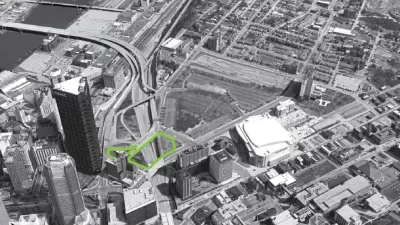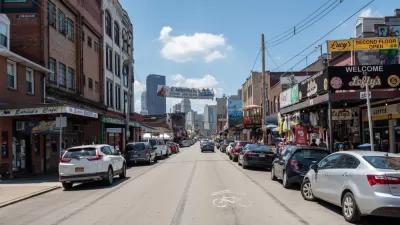The city of Pittsburgh has ambitious plans for a $27 million cap park over Interstate 579, built to reconnect the Lower Hill neighborhood with the rest of the city.
Anthony Conroy reports on plans in Pittsburgh "to build a pedestrian park over Crosstown Boulevard and connect the Lower Hill District to Downtown."
"The idea for the project was first floated in 2009 as a way to help development in the Lower Hill and create a safe and efficient passage for pedestrians and bicyclists needing to get to and from Downtown and the city’s eastern neighborhoods," according to Conroy.
The park would cap 300 feet of Interstate 579. Project designers, from LaQuatra Bonci Associates, released updated designs earlier this week at a public hearing and community workshop.
Across the state in Philadelphia, local and state leaders recently announced a funding pledge that could provide the final push for another cap park project on the city's waterfront.
FULL STORY: Meeting planned on an overpass park that would cap I-579/Crosstown Blvd.

Planetizen Federal Action Tracker
A weekly monitor of how Trump’s orders and actions are impacting planners and planning in America.

Maui's Vacation Rental Debate Turns Ugly
Verbal attacks, misinformation campaigns and fistfights plague a high-stakes debate to convert thousands of vacation rentals into long-term housing.

Restaurant Patios Were a Pandemic Win — Why Were They so Hard to Keep?
Social distancing requirements and changes in travel patterns prompted cities to pilot new uses for street and sidewalk space. Then it got complicated.

In California Battle of Housing vs. Environment, Housing Just Won
A new state law significantly limits the power of CEQA, an environmental review law that served as a powerful tool for blocking new development.

Boulder Eliminates Parking Minimums Citywide
Officials estimate the cost of building a single underground parking space at up to $100,000.

Orange County, Florida Adopts Largest US “Sprawl Repair” Code
The ‘Orange Code’ seeks to rectify decades of sprawl-inducing, car-oriented development.
Urban Design for Planners 1: Software Tools
This six-course series explores essential urban design concepts using open source software and equips planners with the tools they need to participate fully in the urban design process.
Planning for Universal Design
Learn the tools for implementing Universal Design in planning regulations.
Heyer Gruel & Associates PA
JM Goldson LLC
Custer County Colorado
City of Camden Redevelopment Agency
City of Astoria
Transportation Research & Education Center (TREC) at Portland State University
Jefferson Parish Government
Camden Redevelopment Agency
City of Claremont





























